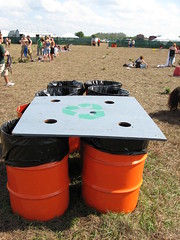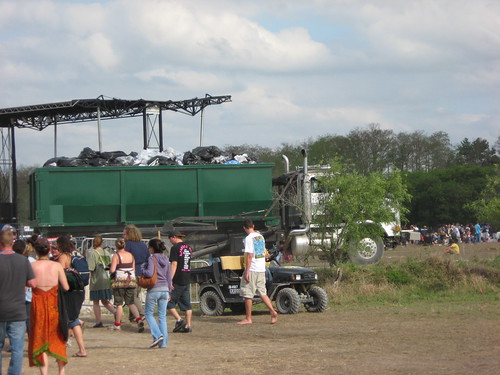With only about 10,000 fans at Telluride and 3500 at the smaller events, the Colorado Bluegrass shows are smaller than the new breed of Bonnaroo and Rothbury megafestivals, but they're also older. This year marks Telluride's 35th anniversary, and the 20th year that Steve has been running things with a small year-round crew of about 6 staff. For the fans, being smaller means that everyone can get closer to the stage. For the promoters, being older means more room to experiment with things like greening.
Steve and the gang at Telluride like to think of themselves as trailblazers in the field of festival greening, and they've got a solid history to back them up. Beyond greening Telluride, they've also moved into greening their everyday operations, including their offices, housed in a former blacksmith's shop that dates back to the 1860's.
The story of Telluride's greening began in 2002, when the festival started a partnership with the legendary New Belgium brewing company, home of Fat Tire Ale. It seems odd now, but in 2002 almost nobody was thinking about sustainability, especially at the corporate level. New Belgium had recently hired Hillary Mizia, a "sustainability goddess" whose unflagging enthusiasm for all things green soon spread to the Bluegrass crew. "She was really pushing us, saying 'you guys can do this, you guys can do that,'" Szymanski recalls. With Mizia's help, the festival underwent its first sustainability audit that year, and in 2003 it started down the green path with a waste reduction program and the purchase of renewable energy credits to offset electric use at the festival.
Five years later, the sustainability field is rapidly maturing and things like recycling, composting, and offsets are now commonplace. So what is Telluride doing to stay ahead of the curve? Lots, as we'll soon see. Perhaps the most important thing is that the promoters have realized that creating a green festival has certain intangible benefits that can help the bottom line, even if quantifying those benefits isn't always easy. As Steve told me, "It's too early to say if this is paying for itself, but we're hoping to get a handle on that this year. It's really hard to pick out what's happening when you have a sold-out festival. What we've realized is that we've created a brand that is a boutique festival."
With everyone in the organization on board with the new green mission and a sustainability budget in the "tens of thousands of dollars," there's plenty of room to experiment and learn. Take offsets, which regular readers know I'm not a big fan of. Telluride's tackled the issues that worry me head-on, as Szymanski excitedly details: "The biggest thing that we've seen is the travel to the event....We look at our ticket sales and do surveys to find out how people are coming and from how far...over 90% of our carbon is coming from travel of people getting to our event....We're working with carbon offsets, which has its issues, but there are ways around that. There are big questions with offsets: is it additional, is it transparent, is it certifiable, is it local? Because of the Colorado Carbon Fund [we can work] with [offsetting] projects in Telluride and Boulder county. That's really exciting, because now we can say 'your money is staying in the community.'"
That kind of focus on the quality of the greening program is refreshing, especially when it comes from the head of a festival, not an outside consultant who lives and breathes green but might not necessarily get the chance to put ideals into practice. "We don't have the luxury of having a full-time person," says Szymanski, "but this makes it fun for us. It would be a great luxury to hire somebody, but the benefit is that we're educating ourselves and we're not just out there booking bands. The whole group is invested." Szymanski is passionate enough to know that the average car coming in to Telluride averages just under three passengers, and he says that the best incentive for carpooling is the price of gas.
Offsets are one thing, but what about the tougher issues, like phasing out bottled water -a hugely profitable item for all outdoor events and a staple of vendors' income - in favor of free water? Bonnaroo supplements its bottles with free water (expect long lines and a funky sulfur smell), while Rothbury was working on a plan which would offer "low-cost" water, sans bottles, when I talked to organizers earlier this year. Telluride's going a step further. This year, it's asking all of its artists to replace their bottles of Evian with stainless steel water bottles. "The message that we give is what's onstage." The festival will have plentiful free water from the town's public supply, filtered to remove any hint of chlorine. And while vendors will still be allowed to sell water this year, they're also being told that "if they want to sell water they can't sell anything smaller than 1 liter and don't expect to sell a lot."
While Szymanski admits that "there has been a lot of pushback" from vendors on the bottled water issues, he's also firm. Changes like the switch away from plastic to 100% compostable plates and cups and the switch from bottled water to free water are phased in over two years to ease the pain, and vendors who can't cope don't get invited back.
But the ride to sustainability hasn't been entirely smooth. Take composting, for instance. "We had a composting area 16 miles outside of Telluride and we were just so excited'" Szymanski recalls about the initial composting area. "We just let people police themselves and at the end of the show the contamination was just awful. That first year was really rough. We spent a lot of hours sifting through and sorting the compost." The following year, lesson learned, the festival trained a staff of volunteers to help patrons get it right. "If you're a fan who's new to this, you would never think 'oh, the cup and the plate can all go?' To see the light bulbs go off has been kind of fun. It's an expense to have 30 extra people, but I....wouldn't even think about doing this without them."
With offsetting, waste reduction, and the bottled water issue all firmly under control, the next step is getting fans more involved. To this end, the organization has dedicated plenty of real estate on the website, including a "sustainable festivation" blog, a ride share board, and a greening section. But to engage those of us who don't spend every waking minute online, organizers are giving campers a cue from the wilderness backpacking set: leave no trace. "A lot of people bring down all kinds of stuff and just leave it at the end of the event," Szymanski reports. As an incentive to reduce campsite waste, organizers are trying out a green campsite contest this year. "People can just take a few pictures and write down a few things about what they're doing and we post it in our Festival Town area and anyone can vote." The winners receive incentives including free camping at future festivals.
Other green moves include the elimination of plastic bags at the souvenir stands, an emphasis on local foods, and a partnership at the Lyons festival grounds with green guru Hunter Lovins. While Szymanski admits that "events took a front seat" at the new festival grounds while they were establishing the smaller events there, they're now working to catch up on the greening. "[Lovins] is five miles away. She prompted us to do two different energy audits on the buildings to catch up on the home turf...she likes bluegrass music, so she's offered her services."
Speaking of bluegrass music, I asked what a first time fan at Telluride might expect. Steve may be passionate about greening, but it pales in comparison to his enthusiasm for the music, even after 20 years. "Along the way we got this amazing family of musicians. The Sam Bushes, Bela Flecks, there's probably about 12 people who come every year and know that we're going to let them go anywhere they want with their art. Ricky Scaggs and Bruce Hornsby for me is what it's all about. When you hear those guys together weaving in and out and singing each other's songs. They go into this really tight bluegrass thing and then Bruce takes it into this amazing improv jam."
So with that in mind, here's a clip of Bruce and Ricky at Kentucky Thunder.






